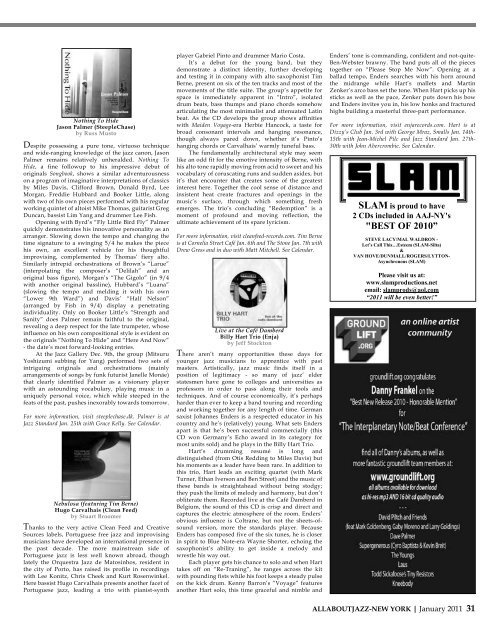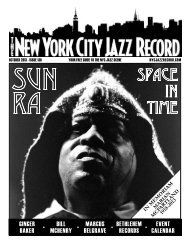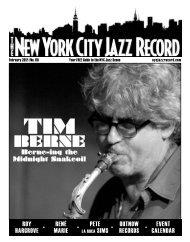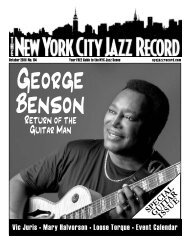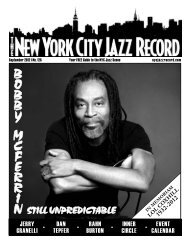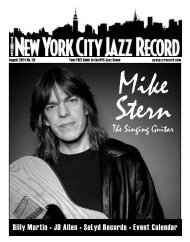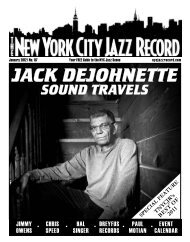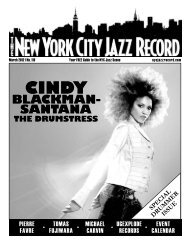heart of gold - The New York City Jazz Record
heart of gold - The New York City Jazz Record
heart of gold - The New York City Jazz Record
You also want an ePaper? Increase the reach of your titles
YUMPU automatically turns print PDFs into web optimized ePapers that Google loves.
Nothing To Hide<br />
Jason Palmer (SteepleChase)<br />
by Russ Musto<br />
Despite possessing a pure tone, virtuoso technique<br />
and wide-ranging knowledge <strong>of</strong> the jazz canon, Jason<br />
Palmer remains relatively unheralded. Nothing To<br />
Hide, a fine followup to his impressive debut <strong>of</strong><br />
originals Songbook, shows a similar adventurousness<br />
on a program <strong>of</strong> imaginative interpretations <strong>of</strong> classics<br />
by Miles Davis, Clifford Brown, Donald Byrd, Lee<br />
Morgan, Freddie Hubbard and Booker Little, along<br />
with two <strong>of</strong> his own pieces performed with his regular<br />
working quintet <strong>of</strong> altoist Mike Thomas, guitarist Greg<br />
Duncan, bassist Lim Yang and drummer Lee Fish.<br />
Opening with Byrd’s “Fly Little Bird Fly” Palmer<br />
quickly demonstrates his innovative personality as an<br />
arranger. Slowing down the tempo and changing the<br />
time signature to a swinging 5/4 he makes the piece<br />
his own, an excellent vehicle for his thoughtful<br />
improvising, complemented by Thomas’ fiery alto.<br />
Similarly intrepid orchestrations <strong>of</strong> Brown’s “Larue”<br />
(interpolating the composer’s “Delilah” and an<br />
original bass figure), Morgan’s “<strong>The</strong> Gigolo” (in 9/4<br />
with another original bassline), Hubbard’s “Luana”<br />
(slowing the tempo and melding it with his own<br />
“Lower 9th Ward”) and Davis’ “Half Nelson”<br />
(arranged by Fish in 9/4) display a penetrating<br />
individuality. Only on Booker Little’s “Strength and<br />
Sanity” does Palmer remain faithful to the original,<br />
revealing a deep respect for the late trumpeter, whose<br />
influence on his own compositional style is evident on<br />
the originals “Nothing To Hide” and “Here And Now”<br />
- the date’s most forward-looking entries.<br />
At the <strong>Jazz</strong> Gallery Dec. 9th, the group (Mitsuru<br />
Yoshizumi subbing for Yang) performed two sets <strong>of</strong><br />
intriguing originals and orchestrations (mainly<br />
arrangements <strong>of</strong> songs by funk futurist Janelle Monáe)<br />
that clearly identified Palmer as a visionary player<br />
with an astounding vocabulary, playing music in a<br />
uniquely personal voice, which while steeped in the<br />
feats <strong>of</strong> the past, pushes inexorably towards tomorrow.<br />
For more information, visit steeplechase.dk. Palmer is at<br />
<strong>Jazz</strong> Standard Jan. 25th with Grace Kelly. See Calendar.<br />
Nebulosa (featuring Tim Berne)<br />
Hugo Carvalhais (Clean Feed)<br />
by Stuart Broomer<br />
Thanks to the very active Clean Feed and Creative<br />
Sources labels, Portuguese free jazz and improvising<br />
musicians have developed an international presence in<br />
the past decade. <strong>The</strong> more mainstream side <strong>of</strong><br />
Portuguese jazz is less well known abroad, though<br />
lately the Orquestra <strong>Jazz</strong> de Matosinhos, resident in<br />
the city <strong>of</strong> Porto, has raised its pr<strong>of</strong>ile in recordings<br />
with Lee Konitz, Chris Cheek and Kurt Rosenwinkel.<br />
Here bassist Hugo Carvalhais presents another facet <strong>of</strong><br />
Portuguese jazz, leading a trio with pianist-synth<br />
player Gabriel Pinto and drummer Mario Costa.<br />
It’s a debut for the young band, but they<br />
demonstrate a distinct identity, further developing<br />
and testing it in company with alto saxophonist Tim<br />
Berne, present on six <strong>of</strong> the ten tracks and most <strong>of</strong> the<br />
movements <strong>of</strong> the title suite. <strong>The</strong> group’s appetite for<br />
space is immediately apparent in “Intro”, isolated<br />
drum beats, bass thumps and piano chords somehow<br />
articulating the most minimalist and attenuated Latin<br />
beat. As the CD develops the group shows affinities<br />
with Maiden Voyage-era Herbie Hancock, a taste for<br />
broad consonant intervals and hanging resonance,<br />
though always pared down, whether it’s Pinto’s<br />
hanging chords or Carvalhais’ warmly tuneful bass.<br />
<strong>The</strong> fundamentally architectural style may seem<br />
like an odd fit for the emotive intensity <strong>of</strong> Berne, with<br />
his alto tone rapidly moving from acid to sweet and his<br />
vocabulary <strong>of</strong> coruscating runs and sudden asides, but<br />
it’s that encounter that creates some <strong>of</strong> the greatest<br />
interest here. Together the cool sense <strong>of</strong> distance and<br />
insistent heat create fractures and openings in the<br />
music’s surface, through which something fresh<br />
emerges. <strong>The</strong> trio’s concluding “Redemption” is a<br />
moment <strong>of</strong> pr<strong>of</strong>ound and moving reflection, the<br />
ultimate achievement <strong>of</strong> its spare lyricism.<br />
For more information, visit cleanfeed-records.com. Tim Berne<br />
is at Cornelia Street Café Jan. 6th and <strong>The</strong> Stone Jan. 7th with<br />
Drew Gress and in duo with Matt Mitchell. See Calendar.<br />
Live at the Café Damberd<br />
Billy Hart Trio (Enja)<br />
by Jeff Stockton<br />
<strong>The</strong>re aren’t many opportunities these days for<br />
younger jazz musicians to apprentice with past<br />
masters. Artistically, jazz music finds itself in a<br />
position <strong>of</strong> legitimacy - so many <strong>of</strong> jazz’ elder<br />
statesmen have gone to colleges and universities as<br />
pr<strong>of</strong>essors in order to pass along their tools and<br />
techniques. And <strong>of</strong> course economically, it’s perhaps<br />
harder than ever to keep a band touring and recording<br />
and working together for any length <strong>of</strong> time. German<br />
saxist Johannes Enders is a respected educator in his<br />
country and he’s (relatively) young. What sets Enders<br />
apart is that he’s been successful commercially (this<br />
CD won Germany’s Echo award in its category for<br />
most units sold) and he plays in the Billy Hart Trio.<br />
Hart’s drumming resumé is long and<br />
distinguished (from Otis Redding to Miles Davis) but<br />
his moments as a leader have been rare. In addition to<br />
this trio, Hart leads an exciting quartet (with Mark<br />
Turner, Ethan Iverson and Ben Street) and the music <strong>of</strong><br />
these bands is straightahead without being stodgy;<br />
they push the limits <strong>of</strong> melody and harmony, but don’t<br />
obliterate them. <strong>Record</strong>ed live at the Café Damberd in<br />
Belgium, the sound <strong>of</strong> this CD is crisp and direct and<br />
captures the electric atmosphere <strong>of</strong> the room. Enders’<br />
obvious influence is Coltrane, but not the sheets-<strong>of</strong>sound<br />
version, more the standards player. Because<br />
Enders has composed five <strong>of</strong> the six tunes, he is closer<br />
in spirit to Blue Note-era Wayne Shorter, echoing the<br />
saxophonist’s ability to get inside a melody and<br />
wrestle his way out.<br />
Each player gets his chance to solo and when Hart<br />
takes <strong>of</strong>f on “Re-Traning”, he ranges across the kit<br />
with pounding fists while his foot keeps a steady pulse<br />
on the kick drum. Kenny Barron’s “Voyage” features<br />
another Hart solo, this time graceful and nimble and<br />
Enders’ tone is commanding, confident and not-quite-<br />
Ben-Webster brawny. <strong>The</strong> band puts all <strong>of</strong> the pieces<br />
together on “Please Stop Me Now”. Opening at a<br />
ballad tempo, Enders searches with his horn around<br />
the midrange while Hart’s mallets and Martin<br />
Zenker’s arco bass set the tone. When Hart picks up his<br />
sticks as well as the pace, Zenker puts down his bow<br />
and Enders invites you in, his low honks and fractured<br />
highs building a masterful three-part performance.<br />
For more information, visit enjarecords.com. Hart is at<br />
Dizzy’s Club Jan. 3rd with George Mraz, Smalls Jan. 14th-<br />
15th with Jean-Michel Pilc and <strong>Jazz</strong> Standard Jan. 27th-<br />
30th with John Abercrombie. See Calendar.<br />
SLAM is proud to have<br />
2 CDs included in AAJ-NY's<br />
"BEST OF 2010”<br />
STEVE LACY/MAL WALDRON -<br />
Let’s Call This…Esteem (SLAM-Silta)<br />
&<br />
VAN HOVE/DUNMALL/ROGERS/LYTTON-<br />
Asynchronous (SLAM)<br />
Please visit us at:<br />
www.slamproductions.net<br />
email: slamprods@aol.com<br />
“2011 will be even better!”<br />
ALLABOUTJAZZ-NEW YORK | January 2011 31


